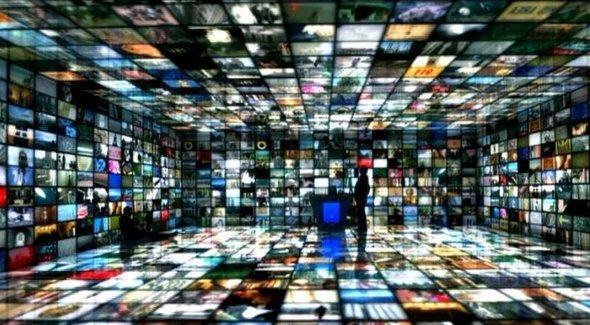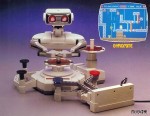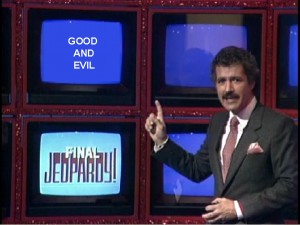|
“Knowledge is power.” |
“Now you’re playing with power.” |
Since the beginnings of Western civilization, we have understood that knowledge, like freedom, isn’t free. While we respect the time and effort it takes to learn, we long for a shortcut, a free sandwich from the lunch lady of the mind. Because it takes so long to acquire and because time is #1 on the list of finite resources, knowledge has always had value. Since the invention of writing, however, that value has been in decline. Thanks to modern technologies, individual facts are worth their weight in Zimbabwean dollars in today’s market. That devaluation has changed the way we work, the way we learn, and most importantly on a site about pop culture, the way we tell stories.
Ancient astronomers spent decades memorizing the sky. Their ability to predict eclipses, equinoxes and such made these men high priests. Then we invented writing, and suddenly, those young whippersnapper priests were spending their nights sitting on the couch, watching the latest episode of Gilgamesh, trusting in written sources for their sacrifices instead of the uphill-both-ways astronomy of their elders. A couple of thousand years later, Guttenberg opened up the whole deal to the plebians and suddenly, knowledge is off the gold standard.
“Books were prohibitively expensive in the so-called ‘good old days.’ In colonial America, in 1760, a cheap schoolbook cost twice as much as a good pair of leather shoes; Smollett’s Complete History of England cost as much as eighty pairs of shoes, six head of cattle, or thirty hogs. An ordinary laborer had to work two days to earn enough money to buy the cheap schoolbook, or 144 days to buy the Smollett. The modern innovations of mass production and marketing have brought down the cost of a paperback to only slightly more than the American minimum wage.”
–Tyler Cowen, In Praise of Commercial Culture, p. 52
These days, whatever the RIAA says, information is free. Google, Napster, Wikipedia and friends put all the world’s data on the internet and iPhone gave us free* and instant access to that information anytime and anywhere.
At lunch with a guy/girl who’s into Iraqi history? 10 seconds from now you can show her the Gilgamesh story in the original cuneiform.
Out for a fancy dinner that night and want to impress him/her with your knowledge of the stars? There’s an app for that.
Can’t think of any good pillow talk? Talk about the implications to society of the fact that the iPhone can now solve a Rubik’s Cube.
Now that your date’s over, we’re here to talk about pop culture, so let’s move on and take a look at how knowledge has been treated in our stories.
In the past, knowledge came in one of two ways and both of those ways had a price.
Scenario 1: you spent years reading, studying, or wandering the desert in order to gain a little wisdom.
Scenario 2: you steal some quick, free wisdom and pay a serious price.
While every once in a while some indy bard would try to tell some impenetrable tales about scenario 1, all the big studio bards knew that option 2 was the way to sell popcorn.
Prometheus was the first big blockbuster to use this theme. In a sort of Ocean’s 1, Prometheus cons his way into the VIP room at Mount Olympus, tricks Zeus himself, and steals the secret to making fire for mankind. As knowledge goes, fire’s a pretty big one, enabling us to cook meat, heat water, not die of hypothermia, and cook meat. Also, it led to meat cooking. Annoyed that he hadn’t been invited to the big inaugural barbeque, Zeus punishes Prometheus by chaining him to a rock and having an eagle EAT OUT HIS LIVER (which regenerates every night) for eternity. Punishing humanity too (possession of stolen goods?), Zeus sends down Pandora and a whole box full of goodies. This was a pretty serious penalty:
“For ere this the tribes of men lived on earth remote and free from ills and hard toil and heavy sicknesses which bring the Fates upon men.”
The Greek gods weren’t the only ones punishing people for illicit knowledge.
One day, your great-great-great-etc. grandparents were hanging out in Paradise when they started feeling a bit peckish. Having just named all the animals, they felt weird about eating them and decided to go with fruit instead. One bite of the apple from the Tree of Knowledge of Good and Evil (Malus cognitiobonitasmalus) and they suddenly find themselves in a Cormac McCarthy novel.
From ancient times on, from Adam to Frankenstein, from Cassandra (the Greek) to Cordelia (the one on Angel), from Harry Potter to basically every character who’s ever been killed for “knowing too much,” knowing things you haven’t studied almost always come with a price. Until now.
Starting with the Matrix (appropriately, the first movie that many of us ever downloaded), we’ve been seeing more and more characters have access to vast quantites of information without paying a price for it.
Watching on our television sized monitors while our 1996 RAM chips tried desperately to keep up, we got seriously excited when Neo looked up from the chair and said “I know Kung-Fu.” This character had obviously been through the ringer, but for this particular information, there was no price. The man lay down for a few minutes, moved his eyeballs around, then sat up with an entirely new skill set. This was heaven. Imagine all the other things he could have simply downloaded: how to hit a baseball, how to talk to girls, how to make Coq au Vin, the compleat works of Shakespeare, algebra 2, or all the words to “We Didn’t Start the Fire.” In the time it took us to watch the movie, he could have taken enough courses to graduate and it wouldn’t have cost him a dime.
This was cool, new and relatable – Neo downloaded knowledge while we had just downloaded Neo – but it didn’t feel real. Neo was a cool and stylish computer hacker even before he had access to this information and he had to leave his whole reality behind before he could access it. The 3 days it took to download the damn movie underscored the fact that we were still a ways away from this sort of thing.
But in 2010, that technology is pretty much a reality, which is why Chuck feels just right.
For those who haven’t seen it, NBC’s Chuck is about a Stanford drop out who lives with his sister and works for a non-actionable version of Best Buy’s Geek Squad. He’s smart but unmotivated, nice but weak – he’s us and he’s firmly grounded in our world. That is until his old roommate sends him an email that puts the Intersect, which contains the databases of the CIA and NSA, directly into his brain. When he comes across visual triggers (the face of an assassin, for instance), Chuck flashes, allowing him to know all about the subject. Suddenly, he’s a major CIA asset, has a beautiful young handler, and is living a life of excitement. For two seasons, the Intersect caused problems, making Chuck a target for the bad guys who want this technology while leaving him unable to defend himself. The show seemed to acknowledge that this knowledge had a price, even if, to my mind, the price was a super hot almost-girlfriend (if he’d just man up) and the kind of life many of us always dreamed about. The show was well-written, well-acted, and some good, solid escapism.
Then, at the end of Season 2, something interesting happened. Chuck gets imprinted with an upgraded version of the Intersect and suddenly, he can download not only information, but skill sets as well. In its first use, Chuck learns how to beat up a number of serious bad guys and, credit where it’s due, says “I know Kung-Fu.”
And this time, it feels real. It feels like the world we live in.
In the four episodes that we’ve seen of Season 3, Chuck has used this new power to learn how to play Mariachi guitar, operate on bullet wounds, and kick people in the face. He forgets his new skills after using them, but why does that matter? Should Chuck find himself in need of Mariachi skills again, he can go back to the source – it’s free and it’s easy. While his handlers and the other spies he comes into contact with have countless hours of training and expertise under their belts, Chuck’s ability to access the information he needs now routinely shows them up. Each episode is a victory of Google vs study, the internet vs the library, this generation vs the last.
This has made the last few episodes of Chuck a real delight. They’re still full of tension and danger, but Chuck has become a whole lot more fun. In an age when information costs nothing and expertise is a click away, any of us can be heroes. The knowledge itself is free and access only costs $126/month and putting up with crappy cell service.





This was a hell of a lot of fun to read, and I basically agree with you, but I want to take it in another direction just for the sake of argument.
So, one of the important things about Prometheus is that he’s democratic, right? It’s not just that he took fire from the gods, it’s that he went and gave it to everyone. Same deal with Adam and Eve. It’s not as explicit, but I’m pretty sure it’s implied that we all get a little slice of that knowledge-of-good-and-evil jazz along with our dose of original sin. Chuck, on the other hand, is the only guy with an intersect. And that means… something? Maybe?
I’m reminded of that scene at the very end of Shaolin Soccer where literally EVERYONE knows wire-fu, and they’re using it to do stuff like parallel park more efficiently. It’s the most ridiculous scene in the movie, and that’s saying something because there’s an earlier scene where a guy gets hit so hard with a soccer ball that all of his clothes fly off. If one person, or a handful of people, have a spark of divine fire, we’re pretty much okay with it. They’re superheroes, we can deal with superheroes. But if you share it with the rest of the world, you get your liver torn out. If Chuck started blabbing state secrets to everyone he met, I bet the government would have Jayne from Firefly put two in the back of his head. (See also the relative reputations of Robert Oppenheimer and Abdul Qadeer Khan.)
This might also explain part of the charm of the smartphone. They’re more and more common, but they’re still not ubiquitous. So as long as you have one and your date doesn’t, you get to be a superhero. I like Chuck a lot, but the day that someone makes a smartphone so cheap that homeless people are using it to download an app called “Panhandlr 2.0” is the day that show gets cancelled.
@stokes:
Actually, Edward Teller totally led a horrible witchhunting blackball quest against Oppenheimer that led to him even getting his basic security clearance revoked. This despite the fact that Oppenheimer had long been out of the military weapons game by this point, and that this whole thing was simply retribution for Oppenheimer going pacifist.
I’m actually not a fan of Intersect 2.0 Chuck. I think a huge part of his appeal was his bumbling nature – his adorkableness. He needed rescuing nearly every episode, and when he did get to play hero, it was usually by accident or through some venue accessible to normal folks (like internet porn virus). Souped up Chuck has lost some of his charm.
@stokes: that’s an interesting point. You say that when everyone has a smartphone and has access to instant information, Chuck’s superpowers cease to be interesting. Your point about the democratic power-sharing Adam, Eve and Prometheus seems to undermine that argument. When their stories were first told, everyone had access to fire and had at least a basic grasp of good and evil. We still do and yet we’re still reading these stories because they celebrate that universal knowledge. We stare into the fire and can still imagine that once upon a time, this magical creature belonged only to the gods.
Similarly, even when we all have access to Chuck-like smart phones, we will still want to celebrate that magic and see it used in ways that are somewhat more exciting than just impressing people at the dinner table.
BTW: I meant to include this in the article, but here’s what the next generation of this technology is going to look like: http://blog.ted.com/2009/03/sixth_sense_demo.php
@Rosa: I hear you, but feel like they’ve managed to give Chuck a little more agency without making him invulnerable. Maybe I’m oversympathizing with the character, but I’m psyched to see him grow up and glad that he’s subject to less humiliation.
well actually…Chuck got expelled from Stanford for “cheating” on an exam (we later learn that Brice made the teacher, who was a CIA recruiter, fabricate the charge because he didn’t want Chuck to get sucked into the spy-world). I find the whole situation rather ironic because Brice ended up bringing Chuck into the whole game, but that’s another article on the whole fate v. free will debate.
I agree with your article, the world is over-saturated with information that some of the more important things get lost in the cracks. Couldn’t that be seen as a consequence of having all that information at our finger-tips?
“In an age when information costs nothing and expertise is a click away, any of us can be heroes.”
Unfortunately this is incorrect. Well the information may be freely available, the use of it still requires a great deal of time to master. Just lesser is the cost of the initial acquisition.
Surely the ability to find information on anatomy and surgical procedures via the World Wide Web does not make one equal to a doctor, or even nurse?
Jurassic Park/The Lost World (Books, not –quite– the films) seems to suggest that the consequence of this ease of access of information is the use of this knowledge without any discipline (Standing on the shoulders of giants without a care for whom supports you); A lack of ability to determine its proper use and the effects there of. Whether it is the eating of tourists in a genetically conceived theme park or the rise of a silicon-based species that imprisons all of humanity in a simulation.
Chuck, like kid from The Computer Wore Tennis Shoes, is more-so a victim*. Unlike Neil who, with his current hard-earned skill set, sought out Morpheus.
*Though from what you write about the third season, he’s now just super-awesome-cool because he can download mad skillz and totally own the baddies. Just, with his foundation as a quirky, intelligent, every-nerd this is more endearing and acceptable. Yes, Chuck has become Jackie Chan in The Tuxedo, just more . . . tolerable.
Somehow I think I’ve lost the point I was filing, leaving a rather oblong and obtuse stub.
mmm… cooked meat….
I have to disagree, the entire premise of your article: that knowledge is free and expertise is easy is pure bunk. Your view of both Neo and Chuck are facile and do not take into consideration the deeper sacrifices and costs each of them face. For Neo, to obtain the power to know kung fu from a download he had to learn the forbidden knowledge, that reality is a lie; he had to surender all of his possessions and his identity he had to “die” as Mr. Anderson to be “reborn” as Neo. Moreover, from learning this forbidden knowledge he eventualy dies, its no different from any other savior myth: there is a moment of enlightenment, the receipt of super-human power, death because of enlightenment. For Chuch, his cost is less obvious, his cost is much like Damocles Sword, he has great power, but he also lives in danger of death every moment of his life. To the extent this re-booted Chuck is not really threatened by death, we have to remember the cost his society bears for him to enjoy this power trip. Chuck is protected by the CIA and the CIA is funded by tax dollars (put your tin foil hats away), at a minimum, the taxpayers are giving Chuck a government subsidized power trip. In this plane of reality taxpayers usually get a say on who will have the privilege to go on government subsidized power trip, when they go to vote every November.